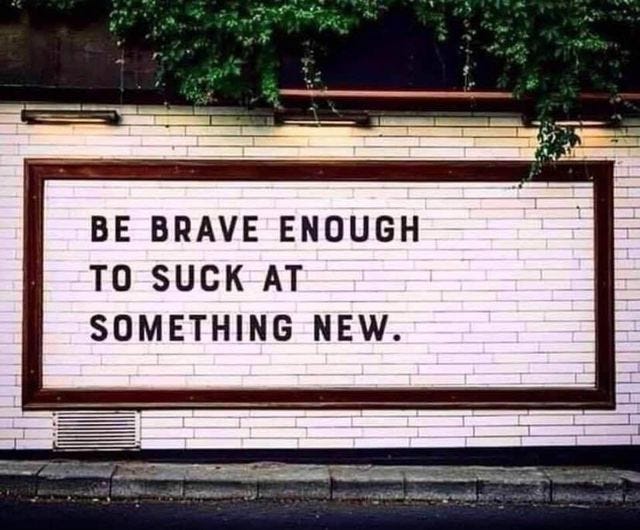Q&A: What Part of Writing Did You Have to Learn the Hard Way?
And how would you advise new writers?
Good morning, Everlastings. The question of the day is, “What part of writing did you have to learn the hard way?” If you’ve been writing long enough you’ve probably found what works for you. How much easier would it have been if you had discovered these things early on, when you needed them most?
I don’t mean the easy stuff, like ‘just write’, or ‘read voraciously’, or ‘listen to your heart’, or ‘Pay attention to grammar and punctuation’, I mean those things that took way too long.
For me it was understanding my own ego, recognizing that of course I want attention! If I didn’t, I would have stuck to keeping a diary instead of throwing my heart and guts out into the lion’s den where there’s a real chance I could be devoured, or at least chewed into pulp. (Maybe a bit of hyperbole there. It feels like that sometimes.)
Early on, here at Writer Everlasting, I published a piece for new writers, giving them an idea of what to avoid as they started out. I began it this way:
I’m glad I’m not a new writer today. I would never make it. I was nervous enough worrying over the ridiculous thought that I could be that magic word — a writer — without having to be inundated by thousands of warnings and millions of bits of advice, much of it contradictory, about what I would need to do to get it done.
If you go to Amazon and type in “books on writing”, as I did today, you’ll find over 60,000 of them. That’s just books. That’s not magazines, conferences, courses, seminars, or webinars. That’s not individual coaching, for-profit editing, or the bazillions of articles on how to be a better writer.
What a downer! If I had read that as a new writer, would I have gone on? Or, at the very least, would I have finished reading that article? I hope so, because I did give some good advice, even while telling them to take most of that other advice with a grain of salt. 😉
Every bit of writing can be a lesson, even the crap stuff. If you cringe at something you’re reading, congratulations! You’ve learned what not to do.
If something you read thrills you and makes you stop and ponder, come down off that cloud and study what the writer did to make that happen. It’s not a trick, it’s a skill, and it didn’t happen by wishing upon stars.
Every would-be writer wants to get noticed fast. Slow down. You still have a lot to learn. If you push it and you’re not ready, you’re going to crash and burn. You’re going to hate what you’ve written (trust me), and you’re either going to quit or you’re going to settle for mediocrity.
Something else I wish I’d figured out earlier: when you get comfortable with your writing it changes everything. The thoughts come easier, the words look more like talking, and the act of editing becomes a joy. Like fitting together pieces of a puzzle—you know the finished product is in there, you just have to rethink, rearrange, and work it out.
And if it takes more time than you think it should, you’re going to need to adjust:
Go into it knowing you have much to learn, that there are no shortcuts or easy fixes, and you’ll develop the kind of mindset that will sit you down and cause you to write. Writing is learning. Making mistakes is learning. Writing a paragraph you never thought you were capable of writing is learning.
You can’t learn to be a writer without writing, and when you’re chasing the elusive solutions you’re not writing. There is no magic except what you bring to it. Magical things will happen when you settle in and discover the writer within you. Nobody else can help you with that.
So here’s your chance, both new and seasoned writers:
Seasoned writers: What advice would you give? Which detour or roadblock would you avoid next time?
New writers: What do you look for? Is it advice? Is it reading about how other writers did it? Is it reading stories that speak to you?
Let’s chew on this for a while.
But only for so long.
Then we really have to get back to writing.



I’m not new to writing but am new in the sense of publishing work online. I have been fortunate to not envy others like I used to and appreciate their artistry and learn from it instead. I am taking a lot in: how to insert character traits, describing action, tightening dialogue, thinking about the practicality of plot elements… it is all learning and while I like most things I write to someday be in someone’s hands, I understand that writers must “sketch” too. We have to work out elements or try different techniques.
I would say I need to lean more on outlines to help with longer compositions. I tend to want to drive in the dark with headlights to see where things go. But you can write yourself into a corner quickly.
The most important thing is to write a lot more than you publish. All writing must not be for others, or it will remain shallow and performative. Every writer must have a private narrative that allows their most honest expression to develop.
In an age where our entire lives are on display to others, and often to strangers, it is in fact comforting to think that you could write something, and hit publish, and maybe no one would read it. That is freedom in its own way.